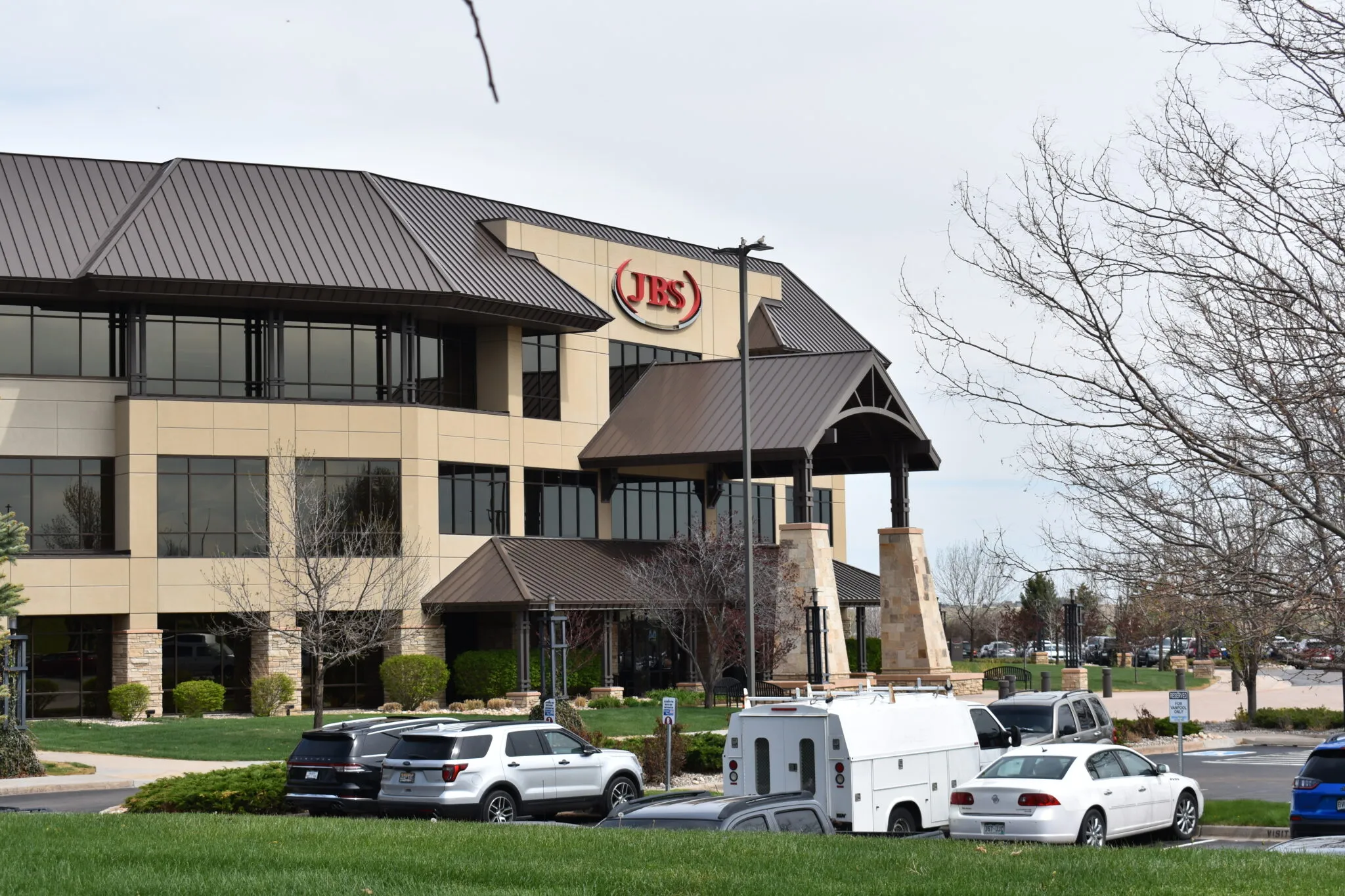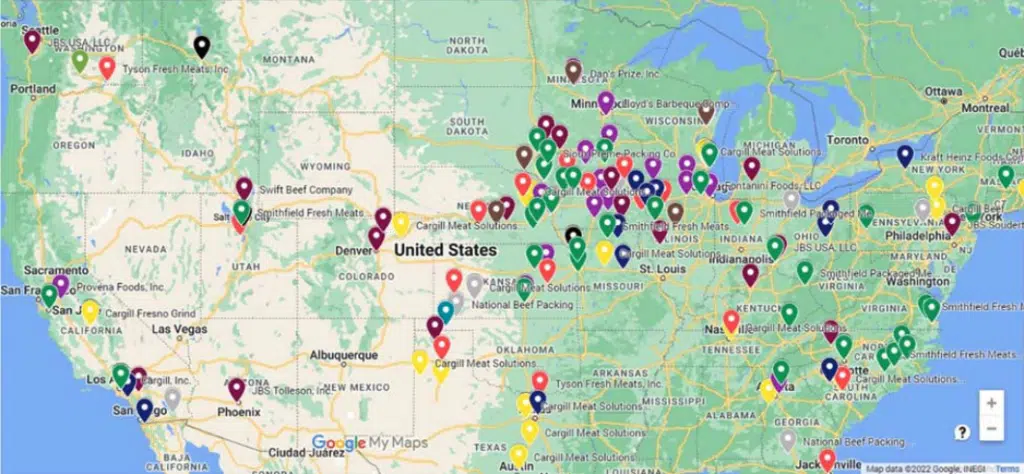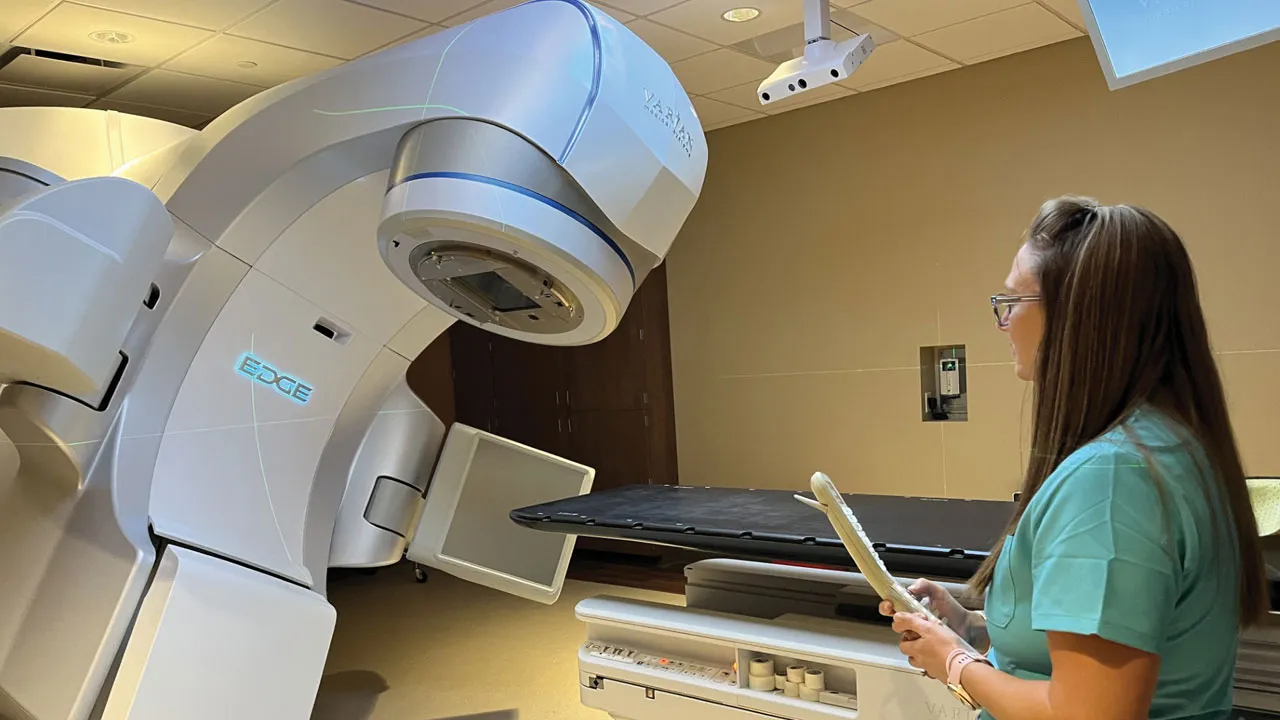JBS, other meat processors accused of fixing wages
Workers file class-action lawsuit against 11 processors

DENVER — A group of the largest red-meat producers in the United States — companies that collectively make up about 80% of the market — faces a class-action lawsuit from workers claiming that since 2014, the companies have colluded and conspired to fix and depress wages and salaries.
The lawsuit, filed last week in the U.S. District Court for the District of Colorado, alleges that executives from the companies — including Greeley-based JBS USA — shared compensation data with each other, held secret meetings to determine future raises for all their employees, agreed not to recruit each other’s workers and more.
“Defendant Processors engaged in the conspiracy to increase their profits by reducing labor costs, which comprise a substantial share of each Defendant Processor’s total operating costs,” the lawsuit reads. “The intended and actual effect of Defendants’ conspiracy to fix compensation has been to reduce and suppress the wages, salaries, and benefits paid to Class Members since January 2014 to levels materially lower than they would have been in a competitive market.”
SPONSORED CONTENT
The lawsuit alleges that, in doing so, the defendants violated federal antitrust law, the Sherman Antitrust Act of 1890.
The list of defendants in the lawsuit includes a veritable who’s who of red meat production giants:
- Agri Beef Co., based in Boise, Idaho.
- American Foods Group LLC, based in Green Bay, Wisconsin.
- Cargill Inc., based in Minneapolis.
- Hormel Foods Corp., based in Austin, Minnesota.
- JBS USA Food Co., based in Greeley.
- National Beef Packing Co. LLC, based in Kansas City, Mo.
- Perdue Farms LLC, based in Salisbury, Maryland.
- Seaboard Foods LLC, based in Merriam, Kansas.
- Smithfield Foods Inc., based in Smithfield, Virginia.
- Triumph Foods Inc., based in St. Joseph, Missouri.
- Tyson Foods Inc., based in Springdale, Arkansas.
The lawsuit compares these defendants to a “cartel.”

The red meat industry in the U.S. produced 12.6 million metric tons of beef and 12.5 million metric tons of pork in 2021. Together, those defendants accounted for about 80% of that production. They operate 140 plants throughout the continental U.S.
The defendants bring in huge amounts of revenue. JBS made nearly $30 billion from red-meat sales in 2020.
Meanwhile, according to the complaint, the difference between average hourly wages paid to meatpacking workers across various plants operated by the defendants shrunk substantially after 2014: from 53 cents to 1 cent at neighboring National Beef and Cargill plants in Kansas; from 63 cents to 4 cents among three plants in Nebraska; from 22 cents to 7 cents at three plants in Texas and Oklahoma.
In addition to allegations that they gathered compensation data and secretly met to exchange that data, the defendants also are accused of entering into illegal agreements with each other to not recruit each other’s employees.
Two data and consulting companies, Fort Wayne, Indiana-based Agri Stats Inc. and Pottstown, Pennsylvania-headquartered Webber, Meng, Sahl & Co. Inc., were also named as defendants in the lawsuit for allegedly helping the meat producers conspire and collude.
The case has three lead plaintiffs:
- Ron Brown, an Iowa employee of Smithfield Farms.
- Minka Garmon, a Georgia employee of National Beef.
- Jessie Croft, an Iowa employee of Iowa Premium LLC, a subsidiary of National Beef.
They represent about 150,000 people who are collectively employed by the defendants in the continental U.S. According to the complaint, about 90% of those employees are hourly workers who work on the production lines or perform maintenance on the machines. About 10% are salaried employees who work as supervisors, buyers, human resources or quality assurance workers.
Between 70% and 80% of workers employed by the defendants are represented by the United Food and Commercial Workers International union.
Neither attorneys for the plaintiffs nor representatives of any of the defendants responded to requests for comment by press time.
Meatpacking workers are largely impoverished and vulnerable
Most of the production plants owned by the defendants are located in the South and Midwest within close geographic proximity. Every defendant has at least one plant that is within 80 miles of a plant owned by another defendant, the complaint states.
Additionally, the processes and standards at plants owned by different defendants are quite similar.
“Because Defendant Processors, their subsidiaries, and related entities slaughter and process commodity red meat products in a similarly efficient manner, their red meat processing facilities were and are characterized by highly similar operations and thus highly similar labor requirements,” the complaint reads.
Meatpacking is one of the most dangerous industries in the U.S., according to the complaint, with a nonfatal injury rate of around 20%. Meatpacking workers are seven times more likely to suffer repetitive strain injuries. Hazards include high noise levels, dangerous equipment, slippery floors, musculoskeletal disorders and hazardous chemicals.
Because of these dangers and the low compensation in the industry, many Americans are unwilling to work meatpacking jobs, the complaint states. Because of this, “Defendant Processors, their subsidiaries, and related entities often recruit hourly-paid workers who have limited alternative options for employment. Many of the hourly-paid workers recruited and hired by Defendant Processors, their subsidiaries, and related entities are migrant workers, refugees, asylum seekers, prison laborers, or participants in court-ordered substance-abuse programs.”
Many of these people don’t speak English and lack a formal education. About 45% of hourly meatpacking employees live below the poverty line and lack health insurance.
Because of all these vulnerabilities, the complaint states, meatpacking workers are unlikely to report abuse or injuries. They don’t complain or ask for breaks or raises. They don’t file for workers comp. They just keep working harder.
“The depressed compensation provided to hourly-paid workers in red meat processing plants owned by Defendant Processors, their subsidiaries, and related entities left many of those workers in poverty,” the complaint states.
Labor makes up between 60% and 70% of the operating costs for red-meat processors.
Secret surveys
According to the complaint, compensation decisions at the defendant companies were made in a formulaic way across the country at the highest executive levels, with executives determining compensation schedules for their own company, then comparing them with those at other companies.
“Those schedules were aligned with compensation schedules that other Defendant Processors had established for the same positions,” the complaint states. “The fact that they did so at the corporate level reflects the significance of labor costs to their overall profitability. That centralization materially facilitated the formation and implementation of the compensation-fixing conspiracy alleged herein.”
It started with surveys, the complaint alleges. Beginning in 2014, executives at the defendant companies designed a “Red Meat Industry Compensation Survey” that allowed them to compare compensation data for numerous positions from company to company.
In addition to salary and wage data, the survey allowed executives to compare compensation such as pension and retirement plan contributions, amount of life insurance coverage, provision of sick leave days, number of annual holidays and vacation days, health care costs per employee, medical insurance deductibles and more.
The survey also included detailed data on all future compensation increases “despite knowing that doing so fell outside the Safe Harbor Guidelines and violated the antitrust laws,” the complaint alleges.
Conspiratorial meetings alleged
Every year after the survey was completed, executives from the defendant companies met in secret to discuss the results, beginning with a 2014 meeting at the Kansas City Airport Sheraton, according to the complaint.
At these meetings, the defendants engaged the consulting company Webber, Meng, Sahl & Co. Inc. to present the surveys, according to the complaint, with WMS representatives often being asked to leave the meetings after presenting their data, at which time the meat-processing executives would discuss, determine and agree on salaries, wages, bonuses and benefits. Plaintiffs allege that the defendants would agree upon plans for salary and wage increases going forward.
“Specifically, the executives of the Defendant Processors agreed upon and suppressed the wages, salaries, bonuses, and benefits that they would provide to employees at red meat processing plants in the continental United States,” the complaint alleges. “[They] also specifically discussed, and agreed upon, plans for salary raises and bonus budgets for the upcoming year. These discussions and agreements had the predictable effect of limiting raises and bonuses paid to employees at red meat processing facilities owned by Defendant Processors, their subsidiaries, and related entities.”
Executives also colluded and conspired at dinners and other events outside the meetings, the complaint alleges.
According to the complaint, the surveys stopped in 2020 when the defendants became worried about antitrust violations but resumed in 2021.
“In the absence of injunctive relief from this Court, it is clear that Defendants will continue to engage in collusive activities with the purpose and intent of suppressing compensation to Class Members,” the complaint states.
Allegations of hidden data-sharing
The defendants allegedly used the subscription service Agri Stats Inc. to compare and share compensation data on a monthly basis. The complaint describes Agri Stats as a “secret clearinghouse of information for the protein industry to aid companies in maximizing their profit margins at the expense of consumers, and in this case, workers.”
Agri Stats provided detailed, plant-level data for comparison from company to company on a give-data-to-get-data basis, which the complaint alleges was used to maintain the secrecy of exchanges between large producers.
Agri Stats also provided weekly and monthly profit information to defendants so they could “monitor the profitability of all cartel members, and to punish any participant who deviated from their agreement.”
The data exchanged through Agri Stats “bears all the hallmarks of an enforcement mechanism for an anticompetitive compensation scheme … Agri Stats’s collection and dissemination of such competitively sensitive compensation data allowed the Defendants to compare and coordinate their compensation decisions and police each other to detect any violations of the conspiracy as they occurred.”
Human-resources and compensation executives at the various defendant companies would also engage in direct, secret communications with each other regarding employee compensation, the complaint states.
“[They] often requested and obtained the pay ranges for both hourly-paid workers and salaried workers employed by those competing pork processors at their pork processing plants…to align its own hourly and salaried workers’ compensation schedules with the compensation schedules of competing processors…to reduce and eliminate competition with those competing processors for labor and thereby reduce worker turnover,” the complaint says.
Companies also illegally conspired to not hire each other’s employees, the complaint alleges. For example, JBS and Iowa Premium operated plants just 23 miles from each other that would frequently see employees move from one to the other for higher compensation. In 2016, the companies “agreed to severely limit their competition for processing plant workers … Defendants’ no-poaching agreement was not made for any legitimate business purpose. Instead, the purpose and effect of Defendants’ no-poaching agreement was to stop competing for a limited pool of valuable workers and to stagnate and depress those workers’ compensation.”
What’s next?
The plaintiffs in the case are asking for a recovery of damages to be determined later, and that the amount of damages be tripled. They are also asking for the defendants to be permanently enjoined from engaging in the alleged conduct again, and they demanded a jury trial.
The defendants have yet to respond to the complaint.
Plaintiffs are being represented by the law firms Hagens Berman Sobol Shapiro LLP, Handley Farah & Anderson PLLC, Cohen Milstein Sellers & Toll PLLC, Lockridge Grindal Nauen PLLP and Berger Montague PC.
The case is Ron Brown, Minka Garmon, and Jessie Croft, individually and on behalf of all others similarly situated v. JBS USA Food Co.; Cargill Inc., Cargill Meat Solutions Corp.; Hormel Foods Corp.; American Foods Group LLC; Triumph Foods LLC; Seaboard Foods LLC; National Beef Packing Co. LLC; Iowa Premium LLC; Smithfield Foods Inc.; Smithfield Packaged Meats Corp.; Agri Beef Co.; Washington Beef LLC; Perdue Farms Inc.; Agri Stats Inc.; and Webber, Meng, Sahl, and Co. Inc. d/b/a WMS & Co. Inc.
DENVER — A group of the largest red-meat producers in the United States — companies that collectively make up about 80% of the market — faces a class-action lawsuit from workers claiming that since 2014, the companies have colluded and conspired to fix and depress wages and salaries.
The lawsuit, filed last week in the U.S. District Court for the District of Colorado, alleges that executives from the companies — including Greeley-based JBS USA — shared compensation data with each other, held secret meetings to determine future raises for all their employees, agreed not to recruit each other’s workers and more.
“Defendant…





